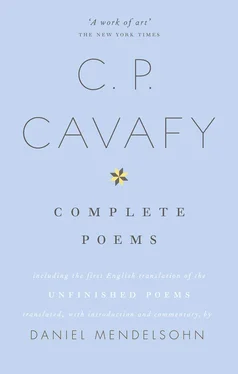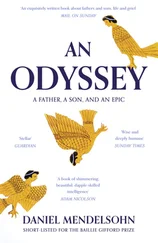For it was clear as you looked at this work
(the artist’s idea was easily grasped)
that the youth in this portrait wasn’t meant
for those who love in a somewhat wholesome way,
within the limits of what is strictly permitted—
with his chestnut-brown, intensely colored eyes;
with the superior beauty of his face,
the beauty of unusual allures;
with those flawless lips of his that bring
pleasure to the body that it cherishes;
with those flawless limbs of his, made for beds
called shameless by the commonplace morality.
[ 1892? ; 1922]
He’s lost him utterly. And from now on he seeks
in the lips of every new lover that he takes
the lips of that one: his. Coupling with every new
lover that he takes he longs to be mistaken:
that it’s the same young man, that he’s giving himself to him.
He’s lost him utterly, as if he’d never been.
The other wished—he said— he wished to save himself
from that stigmatized pleasure, so unwholesome;
from that stigmatized pleasure, in its shame.
There was still time, he said— time to save himself.
He’s lost him utterly, as if he’d never been.
In his imagination, in his hallucinations
in the lips of other youths he seeks the lips of that one;
He wishes that he might feel his love again.
[ 1923 ; 1923]
Julian, Seeing Indifference
“Seeing, then, that there is great indifference
among us toward the gods”—he says with that solemn affect.
Indifference. But what then did he expect?
Let him organize religion as much as he pleased,
let him write the high priest of Galatia as much as he pleased,
or to others like him, exhorting, giving directions.
His friends weren’t Christians: that much is certain.
But even so they weren’t able to
play the way that he did (brought up as a Christian)
with the system of a new religion,
ridiculous in theory and in practice.
In the end they were Greeks. Nothing in excess, Augustus.
[ 1923? ; 1923]
Epitaph of Antiochus, King of Commagene
After she returned from his funeral, greatly bereaved,
the sister of him who had temperately and sweetly lived—
the exceedingly scholarly Antiochus, king
of Commagene—she wanted an epitaph for him.
And the Ephesian sophist Callistratus—who sojourned
often in the principality of Commagene,
and who in the royal household had been
so pleasantly and frequently received—
wrote it, at the suggestion of Syrian courtiers,
and sent it to her aged ladyship.
“May the renown of Antiochus the benevolent king
be meetly extolled, O Commagenians.
He was the provident captain of the land.
The life he lived was just, and wise, and gallant.
The life he lived, still more, was that finest thing: Hellenic—
mankind holds no quality more precious:
among the gods alone does anything surpass it.”
[ 1923? ; 1923]
Theater of Sidon (400 A.D.)
A respectable citizen’s son— above all else, a beauteous
youth who belongs to the theatre, agreeable in so many ways:
I now and then compose, in the language of the Greeks,
exceedingly daring verses, which I circulate
very secretly, of course— gods! they mustn’t be seen
by those who prate about morals, those who wear gray clothes—
verses about a pleasure that is select, that moves
toward a barren love of which the world disapproves.
[ 1923? ; 1923]
Foolhardy doings, full of risks.
The encomia for the ideals of the Greeks.
The white magic and the visits to the pagans’
temples. The raptures over the ancient gods.
The frequent conversations with Chrysanthius.
The theories of the (quite clever) philosopher Maximus.
And look at the result. It’s obvious that Gallus
is very anxious. Constantius is suspicious.
Ah, his advisors weren’t wary in the least.
This story’s gone too far, Mardonius says,
and it’s got to stop at once, all this furore.—
Julian is going back, a Lector once more,
to the church at Nicomedia,
where, loudly and with considerable
piety, he reads the holy Scriptures,
and at his Christian reverence the people wonder.
[ 1892? ; 1924? ; 1924]
Before Time Could Alter Them
They were very pained when they parted company.
They themselves didn’t want it; it was just the way things were.
The need to make a living was forcing one of them
to go far away— New York or Canada.
Certainly their love wasn’t the same as before;
the attraction had been gradually diminished,
its attraction had been very much diminished.
But still, that they should part— that they didn’t want.
It was just the way things were.— Or perhaps it was that Fate
Конец ознакомительного фрагмента.
Текст предоставлен ООО «ЛитРес».
Прочитайте эту книгу целиком, купив полную легальную версию на ЛитРес.
Безопасно оплатить книгу можно банковской картой Visa, MasterCard, Maestro, со счета мобильного телефона, с платежного терминала, в салоне МТС или Связной, через PayPal, WebMoney, Яндекс.Деньги, QIWI Кошелек, бонусными картами или другим удобным Вам способом.












